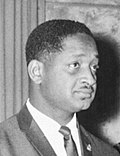You can help expand this article with text translated from the corresponding article in Spanish. (June 2021)Click [show] for important translation instructions.
|
15 December 1980 | |||||||||||||||||||||||||||||||||||||||||||||
53 of the 65 seats in the National Assembly 33 seats needed for a majority | |||||||||||||||||||||||||||||||||||||||||||||
|---|---|---|---|---|---|---|---|---|---|---|---|---|---|---|---|---|---|---|---|---|---|---|---|---|---|---|---|---|---|---|---|---|---|---|---|---|---|---|---|---|---|---|---|---|---|
| Registered | 493,550 | ||||||||||||||||||||||||||||||||||||||||||||
| Turnout | 82.31% ( | ||||||||||||||||||||||||||||||||||||||||||||
| |||||||||||||||||||||||||||||||||||||||||||||
 Results by district | |||||||||||||||||||||||||||||||||||||||||||||
| |||||||||||||||||||||||||||||||||||||||||||||
 |
|---|
| Constitution |
General elections were held in Guyana on 15 December 1980. [1] The result was a victory for the People's National Congress, which won 41 of the 53 directly-elected seats. However, the PNC's victory was the result of fraud as the government had direct control of the elections. [2] Voter turnout was 82.3%. [1]


